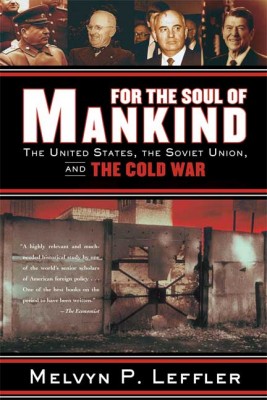| For the Soul of Mankind: The United States, the Soviet Union, and the Cold War Contributor(s): Leffler, Melvyn P. (Author) |
|
 |
ISBN: 0374531420 ISBN-13: 9780374531423 Publisher: Hill & Wang OUR PRICE: $24.30 Product Type: Paperback - Other Formats Published: September 2008 Annotation: "A highly relevant and much-needed historical study . . . One of the best books on the period to have been written." --"The Economist" To the amazement of the public, pundits, and even the policymakers themselves, the ideological and political conflict that endangered the world for half a century came to an end in 1990. How did that happen? What had caused the cold war in the first place, and why did it last as long as it did? To answer these questions, Melvyn P. Leffler homes in on four crucial episodes when American and Soviet leaders considered modulating, avoiding, or ending hostilities and asks why they failed. He then illuminates how Reagan, Bush, and, above all, Gorbachev finally extricated themselves from the policies and mind-sets that had imprisoned their predecessors, and were able to reconfigure Soviet-American relations after decades of confrontation. |
| Additional Information |
| BISAC Categories: - History | United States - 20th Century - History | Modern - 20th Century - History | Russia & The Former Soviet Union |
| Dewey: 327.730 |
| Physical Information: 2.1" H x 5.5" W x 8.2" (1.20 lbs) 608 pages |
| Themes: - Cultural Region - Russia - Chronological Period - 1950-1999 - Chronological Period - 1940's - Chronological Period - 20th Century |
| Descriptions, Reviews, Etc. |
| Publisher Description: To the amazement of the public, pundits, and even the policymakers themselves, the ideological and political conflict that had endangered the world for half a century came to an end in 1990. How did that happen? What caused the cold war in the first place, and why did it last as long as it did? The distinguished historian Melvyn P. Leffler homes in on four crucial episodes when American and Soviet leaders considered modulating, avoiding, or ending hostilities and asks why they failed: Stalin and Truman devising new policies after 1945; Malenkov and Eisenhower exploring the chance for peace after Stalin's death in 1953; Kennedy, Khrushchev, and LBJ trying to reduce tensions after the Cuban Missile Crisis of 1962; and Brezhnev and Carter aiming to sustain d tente after the Helsinki Conference of 1975. All these leaders glimpsed possibilities for peace, yet they allowed ideologies, political pressures, the expectations of allies and clients, the dynamics of the international system, and their own fearful memories to trap them in a cycle of hostility that seemed to have no end. For the Soul of Mankind illuminates how Reagan, Bush, and, above all, Gorbachev finally extricated themselves from the policies and mind-sets that had imprisoned their predecessors, and were able to reconfigure Soviet-American relations after decades of confrontation. |
Contributor Bio(s): Leffler, Melvyn P.: - Melvyn P. Leffler, Stettinius Professor of History at the University of Virginia, is the author of A Preponderance of Power: National Security, the Truman Administration, and the Cold War, which won the Bancroft Prize, the Farrell Prize, and the Hoover Book Award in 1993. |